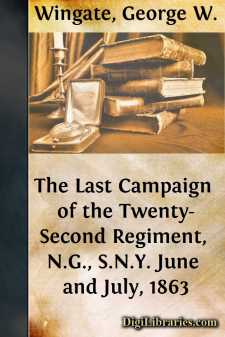Categories
- Antiques & Collectibles 13
- Architecture 36
- Art 48
- Bibles 22
- Biography & Autobiography 813
- Body, Mind & Spirit 142
- Business & Economics 28
- Children's Books 14
- Children's Fiction 11
- Computers 4
- Cooking 94
- Crafts & Hobbies 4
- Drama 346
- Education 46
- Family & Relationships 57
- Fiction 11829
- Games 19
- Gardening 17
- Health & Fitness 34
- History 1377
- House & Home 1
- Humor 147
- Juvenile Fiction 1873
- Juvenile Nonfiction 202
- Language Arts & Disciplines 88
- Law 16
- Literary Collections 686
- Literary Criticism 179
- Mathematics 13
- Medical 41
- Music 40
- Nature 179
- Non-Classifiable 1768
- Performing Arts 7
- Periodicals 1453
- Philosophy 64
- Photography 2
- Poetry 896
- Political Science 203
- Psychology 42
- Reference 154
- Religion 513
- Science 126
- Self-Help 84
- Social Science 81
- Sports & Recreation 34
- Study Aids 3
- Technology & Engineering 59
- Transportation 23
- Travel 463
- True Crime 29
The Last Campaign of the Twenty-Second Regiment, N.G., S.N.Y. June and July, 1863
Description:
Excerpt
On the 18th of June, 1863, it having been definitely ascertained that the rebel horde had invaded Pennsylvania in force, the call of the President was issued to the Empire State, and her militia, leaving everything as it stood—their books unclosed, their ploughs in the furrow—hurried eagerly forward in response, to unite in the defence of our sister State. All day long blue and gray uniforms were dashing frantically backward and forward through the streets, and in and out of the various armories of the city, in search of essentials found missing at the last moment; and in military circles the flurry and commotion were indescribable, particularly at the Palace Garden in Fourteenth street, where the Twenty-second regiment N. G., S. N. Y., assembling in great haste, were preparing to be “off to the war” on their second campaign.
At last the manifold preparations were completed, and amid tumultuous cheering, the fluttering of handkerchiefs, the ringing of bells, and the thousand bewildering noises of an enthusiastic crowd, the regiment formed and marched away—where to, none knew and none cared, so long as they were doing their country a service.
That night was spent in the cattle-cars of the Camden and Amboy Railroad, and the next morning found us entering the City of Brotherly Love, through which, after being fed and washed at the immortal “Cooper Shop,” we took our way for the capital of the state, cheered on by an enthusiastic ovation from the citizens, whose noble behavior and unstinted hospitality to the thousands of soldiers who have passed through the city since the beginning of the war, has obtained for Philadelphia the well-earned reputation of being the most patriotic city in the Union.
The distance from New York to Harrisburg, I believe, may be usually traversed in about eight hours, but (as there was a great need of men), the regiment was kept precisely three days in cattle-cars before being deposited at its destination, no insignificant omen of the fate that awaited its members in the future. Finally, after an immensity of tribulation, we got to Harrisburg, and spent the last of these three days quietly lying alongside of Camp Curtin; this camp, so celebrated in Pennsylvania annals, is a wide level expanse, in the vicinity of the city, and was then crowded with the newly-raised militia, whose general appearance and condition did not inspire us with that exalted idea of their efficiency that the newspapers seemed to have; on the contrary, it seemed to us, that a more indifferent, lazy, uncouth-looking set never was seen outside of rebeldom; but as their ideas of hospitality toward us were demonstrated in copperhead talk and chaffing us with hard names, these views may be prejudiced. At some distance from Camp Curtin, however, were a couple of batteries and some troops from Philadelphia, who really looked like soldiers, and whose appearance inspired the “Yorkers” with a feeling of respect which further acquaintance did not dispel.
But notwithstanding the society, the time hung heavy on our hands, and it was no small relief, when, during the latter part of the afternoon, we were sent across the Susquehanna, some of us into the fortifications, and the others, including the Twenty-second, to camps in the different places near the river, to protect the various approaches and fords in the neighborhood of the city.
It was growing dusky as we arrived at our selected camp-grounds, and, as it was a singular characteristic of the climate of Pennsylvania during our brief sojourn, that darkness is synonymous with rain (for the sun scarcely ever went down before the elements were imitating the movement), it accordingly commenced to rain, and by the time it was fairly dark a heavy storm was raging.
Fortunately, an immense empty barn was at hand, into which the regiment wedged themselves, like sardines in a box, so tight, in fact, that those unfortunates who happened to find themselves under a leak in the roof—and there were many such—had to remain quiet under their douche, and take it coolly for the whole night....


